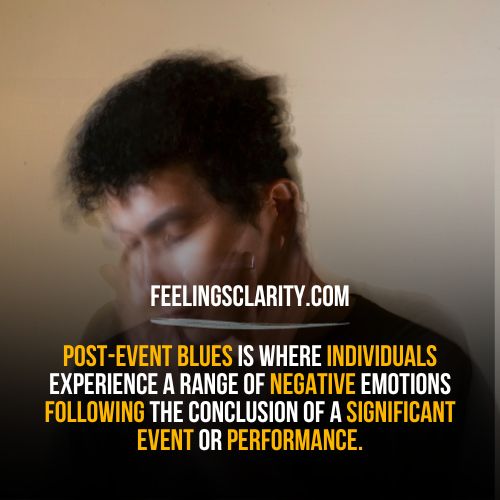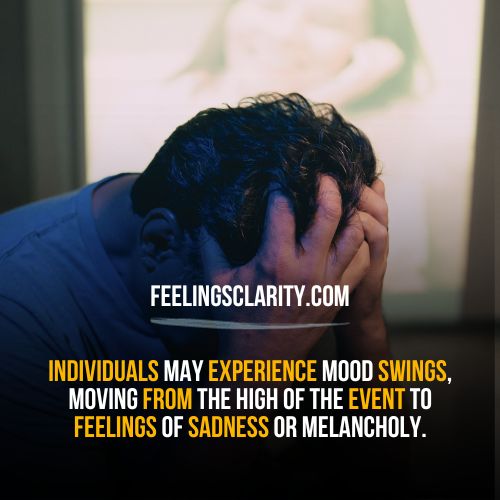The excitement and adrenaline rush of performing or participating in a major event or show can be an exhilarating experience.
However, it’s not uncommon for individuals to encounter a wave of emotions in the aftermath of such events. This emotional dip is often referred to as “post-show depression.”
In this article, we’ll explore what post-show depression is, whether it’s normal, and the common symptoms associated with it.
Jump to a Specific Section
- 1 What is Post-Show Depression?
- 2 Is Having Post-Show Depression Normal?
- 3 Symptoms of Having Post-Show Depression
- 4 Causes of Having Post-Show Depression
- 5 Tips to Overcome Post-Show Depression
- 6 How to Prevent Post-Show Depression
- 6.1 1. Plan Ahead:
- 6.2 2. Stay Connected:
- 6.3 3. Set New Goals:
- 6.4 4. Practice Self-Compassion:
- 6.5 5. Mental Preparation:
- 6.6 Coping Strategies After the Show Ends
- 6.7 1. Acknowledge Your Emotions:
- 6.8 2. Reflect on Achievements:
- 6.9 3. Engage in Self-Care:
- 6.10 4. Reflect on Learning:
- 6.11 5. Creative Outlets:
- 7 Conclusion
- 8 FAQ’s
What is Post-Show Depression?
Post-show depression, also known as post-performance or post-event blues, is a phenomenon where individuals experience a range of negative emotions following the conclusion of a significant event or performance. This emotional low can affect people in various fields, including actors, musicians, athletes, public speakers, and even students after a school play or presentation.

Is Having Post-Show Depression Normal?
Yes, experiencing post-show depression is a normal reaction to the emotional highs and intense energy that often accompany big performances or events. It’s essential to understand that this emotional dip doesn’t indicate a mental health disorder but is rather a natural response to the contrast between the event’s build-up and its conclusion.
Post-show depression is akin to the “come down” after an adrenaline rush. The excitement and anticipation leading up to the event create a surge of positive emotions, but once the event is over, there can be a sense of emptiness or letdown.
Symptoms of Having Post-Show Depression
While the intensity and duration of post-show depression can vary from person to person, some common symptoms include:
1. Mood Swings:
Individuals may experience mood swings, moving from the high of the event to feelings of sadness or melancholy.
2. Loss of Purpose:
After dedicating significant time and effort to prepare for an event, the sudden void of purpose and structure can lead to feelings of emptiness.
3. Irritability:
Some people may become irritable or restless as they adjust to the return to everyday life.
4. Nostalgia:
A strong sense of nostalgia for the event and the camaraderie experienced during preparation and performance can be prominent symptom.
5. Fatigue:
The emotional and physical toll of the event can result in fatigue and low energy levels.
6. Negative Self-Reflection:
Individuals may engage in negative self-reflection, questioning their performance or dwelling on minor imperfections.
7. Difficulty Concentrating:
Concentration and focus may be impaired as thoughts continuously return to the event or performance.
Causes of Having Post-Show Depression
Post-show depression, also known as post-performance or post-event blues, can be triggered by various factors, both emotional and psychological. Understanding these causes can help individuals better cope with and manage the emotional dip that often follows significant events or performances. Here are some common causes:
1. Emotional High to Low:
The transition from the emotional high of a successful performance or event to the return to everyday life can lead to a sudden drop in mood.
2. Loss of Purpose:
After dedicating extensive time and effort to prepare for the event, individuals may feel a loss of purpose once it’s over.
3. Anticipation and Build-Up:
The anticipation and build-up to a big event can create heightened expectations. When the event concludes, the contrast can result in disappointment or letdown.
4. Physical and Emotional Exhaustion:
The physical and emotional toll of a performance or event can lead to exhaustion, both mentally and physically.
5. Self-Criticism:
Individuals may engage in self-criticism, focusing on perceived mistakes or imperfections in their performance.
6. Uncertainty:
The uncertainty about what comes next, particularly if there are no immediate plans or goals, can contribute to feelings of anxiety or sadness.
Tips to Overcome Post-Show Depression
While post-show depression is a common experience, there are strategies to help individuals overcome it:
1. Acknowledge Your Emotions:
Recognize that post-show depression is a normal part of the emotional cycle after a significant event.
2. Set New Goals:
Begin planning for future events or performances to provide a sense of purpose and motivation.
3. Self-Care:
Prioritize self-care activities such as relaxation, exercise, and adequate sleep to boost your mood.
4. Seek Professional Help:
If post-show depression becomes overwhelming or persistent, consider consulting a mental health professional for guidance and support.
How to Prevent Post-Show Depression
While it may not always be possible to entirely prevent post-show depression, there are steps you can take to minimize its impact:
1. Plan Ahead:
Set realistic expectations for post-event emotions and have a plan in place to address them.
2. Stay Connected:
Maintain social connections and support networks to prevent isolation.
3. Set New Goals:
Ensure that you have future goals or events to look forward to, providing a sense of purpose.
4. Practice Self-Compassion:
Be kind and understanding toward yourself, acknowledging that perfection is not attainable.
5. Mental Preparation:
Mentally prepare for the transition from the event to everyday life, focusing on resilience and adaptability.
Coping Strategies After the Show Ends
Coping with the emotional aftermath of a show or significant event ending, often referred to as post-show depression, can be challenging.
Here are some coping strategies to help you navigate this period:
1. Acknowledge Your Emotions:
Recognize and accept that post-show depression is a normal part of the emotional cycle after a significant event. It’s okay to feel a range of emotions during this time.
2. Reflect on Achievements:
Take time to reflect on your accomplishments and the positive aspects of the event. Celebrate your hard work and any successes, no matter how small they may seem.
3. Engage in Self-Care:
Prioritize self-care activities such as relaxation, exercise, and adequate sleep. Taking care of your physical and emotional well-being is essential during this time.
4. Reflect on Learning:
Consider what you’ve learned from the experience, both personally and professionally. Use these insights to grow and improve in your future endeavors.
5. Creative Outlets:
Engage in creative outlets or hobbies that bring you joy and fulfillment. These activities can help channel your energy and emotions positively.

Conclusion
experiencing post-show depression or the emotional aftermath of a significant event is a common and natural part of the human experience.
It’s important to recognize that the intense emotions and fluctuations in mood during this period are typical responses to the contrast between the excitement of the event and its conclusion.
The key to coping with post-show depression lies in acknowledging your emotions, seeking support when needed, and actively engaging in self-care and self-reflection.
Reflect on your achievements, set new goals, and prioritize your well-being through activities that bring you joy and fulfillment.
Remember that this phase is temporary, and with time and resilience, you can navigate through it and emerge with valuable insights and renewed motivation for future endeavors.
Embrace the opportunity for growth, both personally and professionally, that comes with the post-show period, and continue to pursue your passions and aspirations with enthusiasm and confidence.
FAQ’s
1. Is post-show depression a common experience?
- Yes, post-show depression is a common emotional response to the end of a significant event or performance. Many individuals, including artists, performers, and athletes, experience it.
2. How long does post-show depression typically last?
- The duration of post-show depression varies from person to person. It can last for a few days to several weeks. It tends to diminish over time as individuals adjust to the post-event period.
3. Are there any physical symptoms associated with post-show depression?
- While post-show depression is primarily characterized by emotional and psychological symptoms, it can also manifest as physical symptoms such as fatigue, changes in appetite, and sleep disturbances.
4. Can post-show depression affect my motivation for future endeavors?
- Yes, post-show depression can temporarily impact motivation. However, setting new goals and engaging in activities related to your interests can help rekindle motivation and purpose.
5. When should I seek professional help for post-show depression?
- If post-show depression becomes overwhelming, persistent, or significantly impairs your daily functioning, it’s advisable to seek guidance from a mental health professional. They can provide support and coping strategies.
6. Are there specific strategies for coping with post-show depression in the performing arts?
- Coping strategies for post-show depression are generally applicable across different fields. They include self-care, goal-setting, and seeking social support. Engaging with fellow performers and discussing your experiences can also be helpful.
7. Can post-show depression affect my self-esteem and self-confidence?
- Yes, post-show depression can sometimes lead to negative self-reflection and a temporary decrease in self-esteem and self-confidence. It’s important to challenge self-criticism and practice self-compassion during this time.
8. Are there any preventive measures to reduce the impact of post-show depression?
- While it may not always be possible to prevent post-show depression entirely, setting new goals, staying socially connected, and maintaining a balanced lifestyle can help minimize its impact.
9. Are there support groups or communities for individuals experiencing post-show depression?
- Yes, there are often support groups and communities, both online and in-person, where individuals can share their experiences and seek advice from others who have gone through similar emotional challenges.
10. Can post-show depression have positive outcomes, such as personal growth? – Yes, post-show depression can lead to personal growth and self-reflection. It provides an opportunity to learn from the experience, set new goals, and develop resilience in the face of emotional challenges.